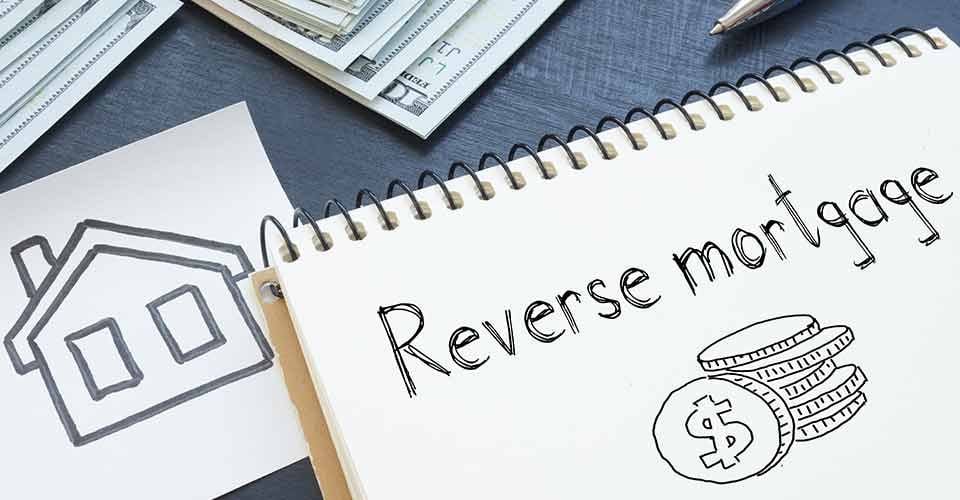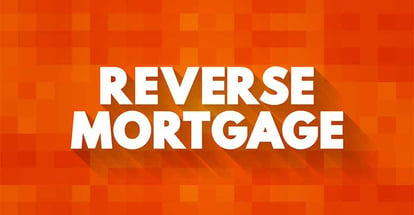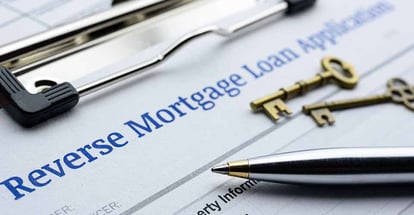Gold, Silver, and Reverse Mortgages: How to Protect Yourself
2023 is ushering in a lot of uncertainty as major American banks begin to fail, war continues in Europe, inflation erodes the U.S. dollar, and analysts predict a recession.
In highly uncertain times, where it’s not clear if banks will continue to fail and what’s to come, it's more important than ever to be able to access the equity in your home. Contrary to popular belief, reverse mortgages are a tool being used by more and more rich people every day.
Getting a reverse mortgage doesn’t mean you have to use the equity in your home, it just gives you the ability to do so in the event of an emergency or unforeseen expense or disaster.
In 2023, more and more seniors are taking out reverse mortgages not as a loan of last resort, but because of its power as a financial instrument for them and their families. Read on to learn about how reverse mortgages can help keep you and your family prepared for anything.
Table of Contents
- The Basics of Reverse Mortgages
- Reverse Mortgages - Myths and Misconceptions
- Understanding the Benefits of Reverse Mortgages
- Protecting Yourself with Reverse Mortgages
- Using Reverse Mortgages to Supplement Retirement Income
- Accessing Your Home Equity Whenever Needed with a Reverse Mortgage
- Reverse Mortgages as a Financial Tool in Times of Uncertainty
The Basics of Reverse Mortgages
Reverse mortgages are a financial product designed to allow homeowners to convert the equity in their homes into cash without having to sell their property or make monthly mortgage payments. Instead, the borrower receives payments from the lender based on the value of their home and their age.
There are two types of reverse mortgages - Home Equity Conversion Mortgages (HECMs) and proprietary reverse mortgages.
HECMs are insured by the Federal Housing Administration (FHA) and are the most common type of reverse mortgage.
Proprietary reverse mortgages, on the other hand, are offered by private lenders and typically have higher loan limits than HECMs.
To be eligible for a reverse mortgage, the borrower must be at least 62 years old, own their home outright or have a low mortgage balance, and live in the property as their primary residence.
In addition, the borrower must undergo financial counseling before obtaining a reverse mortgage to ensure they understand the loan terms and consequences.
Once a borrower has been approved for a reverse mortgage, they have the option to receive their loan proceeds as a lump sum, a line of credit, or a series of payments.
The amount the borrower can receive is based on the value of their home, their age, and the interest rate of the loan.
Reverse Mortgages - Myths and Misconceptions
Reverse mortgages have been subject to a lot of myths and misconceptions over the years, leading many seniors to avoid them as a viable option.
In reality, reverse mortgages can be a powerful financial tool for seniors looking to access the equity in their homes, but it's important to separate fact from fiction when it comes to these loans.
First, it's important to understand what reverse mortgages are. Essentially, a reverse mortgage allows seniors to borrow against the equity in their homes without having to make monthly payments.
Instead, the loan is repaid when the borrower moves out of the home, sells the property, or passes away.
Now, let's take a look at some common myths and misconceptions about reverse mortgages:
-
Myth #1 - Reverse mortgages are only for people who are struggling financially. In reality, many seniors use reverse mortgages as a financial planning tool. They may take out a reverse mortgage to pay off debt, fund home repairs, or supplement their retirement income.
-
Myth #2 - Reverse mortgages are a last resort option. While some seniors do take out reverse mortgages as a last resort, many others use them as a way to access the equity in their homes to improve their quality of life.
- Myth #3 - Reverse mortgages are a scam. While there have been cases of fraudulent lenders offering reverse mortgages, there are legitimate lenders who offer these loans as a valuable financial tool for seniors.
So why are reverse mortgages a viable option for seniors? For one, they allow seniors to access the equity in their homes without having to sell their property or make monthly payments.
They also provide seniors with additional financial flexibility, which can be especially valuable during times of economic uncertainty.

Understanding the Benefits of Reverse Mortgages
As we discussed earlier, reverse mortgages are a type of loan that allows homeowners to access the equity in their homes without having to sell their property or make monthly payments.
But what are the specific benefits of taking out a reverse mortgage, especially in times of economic uncertainty?
First, reverse mortgages can provide seniors with a source of income during times of financial stress. With a reverse mortgage, seniors can access the equity in their homes without having to sell their property or take on additional debt.
This can be especially valuable during times of economic uncertainty when seniors may be facing unexpected expenses or a decline in their retirement savings.
Second, reverse mortgages can provide seniors with financial flexibility. With a reverse mortgage, seniors can choose to receive their loan proceeds as a lump sum, a line of credit, or a series of payments. This can allow them to customize their loan to their specific financial needs and goals.
Finally, more and more seniors are turning to reverse mortgages as a financial planning tool. With rising healthcare costs, longer life expectancies, and a volatile stock market, many seniors are looking for ways to ensure their financial security in retirement.
A reverse mortgage can provide seniors with a source of income that is not tied to the stock market or other volatile investments, allowing them to better manage their finances in retirement.
Overall, reverse mortgages can be a powerful financial tool for seniors looking to access the equity in their homes.
While they may not be the right option for everyone, they can provide valuable benefits during times of economic uncertainty and as a part of a broader financial planning strategy.
If you're considering a reverse mortgage, it's important to work with a reputable lender and to carefully consider the costs and benefits of the loan before making a decision.
Protecting Yourself with Reverse Mortgages
If you're considering a reverse mortgage as a way to protect your financial future during times of economic uncertainty, there are a few tips and strategies you should keep in mind to ensure that you're using this tool effectively.
Here are some key things to consider:
-
Work with a reputable lender - Before taking out a reverse mortgage, make sure that you're working with a reputable lender who can guide you through the process and help you understand the costs and benefits of the loan.
-
Understand the costs and risks - Reverse mortgages can come with higher fees and interest rates than traditional mortgages, and there is the risk of losing your home if you don't meet the loan requirements. Make sure that you fully understand the costs and risks of the loan before proceeding.
-
Plan for the long-term - A reverse mortgage can provide you with a source of income for the rest of your life, but it's important to plan for the long-term. Make sure that you have a plan for how you'll use the loan proceeds and how you'll manage your finances in the future.
-
Consider your heirs - If you're planning to leave your home to your heirs, it's important to understand how a reverse mortgage will impact their inheritance. Work with a financial planner to understand the implications of taking out a reverse mortgage on your estate.
- Maximize the benefits - Finally, make sure that you're taking full advantage of the benefits of a reverse mortgage. Whether you're using the loan to pay off debt, fund home repairs, or supplement your retirement income, there are a variety of ways to use a reverse mortgage to improve your financial situation.
By following these tips and strategies, you can use a reverse mortgage to protect your financial future during times of economic uncertainty.
With careful planning and guidance, a reverse mortgage can be a valuable tool for seniors looking to access the equity in their homes and improve their quality of life.
Using Reverse Mortgages to Supplement Retirement Income
One of the most significant advantages of a reverse mortgage is the ability to access the equity in your home without having to sell or move out of it. This can be particularly helpful for retirees who may be living on a fixed income but have a lot of equity tied up in their homes.
Here are some tips on how to use a reverse mortgage to supplement your retirement income:
-
Determine how much income you need - The first step is to figure out how much extra income you need to support your lifestyle. This will help you determine how much equity you need to access through the reverse mortgage.
-
Choose the right type of reverse mortgage - There are several types of reverse mortgages available, including fixed-rate and adjustable-rate options. Be sure to choose the one that best suits your needs and financial situation.
-
Consider a line of credit - A reverse mortgage line of credit allows you to access funds as needed, rather than taking a lump sum upfront. This can be a good option if you don't need a large amount of money right away, but want to have access to it in case of unexpected expenses.
-
Plan for the long term - Make sure you're not using up all your equity too quickly. Consider setting aside some of the funds from the reverse mortgage to use for future expenses or as a safety net.
- Talk to a financial advisor - Before taking out a reverse mortgage, it's important to speak with a financial advisor to make sure it's the right option for you. They can help you evaluate your options and determine the best strategy for supplementing your retirement income.
By using a reverse mortgage to supplement your retirement income, you can enjoy your golden years without worrying about financial struggles. Just be sure to do your research, plan carefully, and seek the advice of a financial professional.
Accessing Your Home Equity Whenever Needed with a Reverse Mortgage
For many homeowners, their home is their most valuable asset. It's also typically their largest source of equity. But accessing that equity can be difficult and time-consuming, especially during times of economic uncertainty.
This is where a reverse mortgage can be a powerful tool. Rather than being forced to sell your home or take out a home equity loan when you need extra funds, a reverse mortgage allows you to access your home equity whenever you need it.
Here are some benefits of this approach:
-
Flexibility - With a reverse mortgage, you can choose how and when to access your home equity. Whether you need a lump sum upfront, a line of credit, or a steady stream of income, a reverse mortgage can provide the flexibility you need to manage your finances effectively.
-
No monthly payments - Unlike a traditional home equity loan or line of credit, you don't have to make monthly payments on a reverse mortgage. The loan balance is only due when you sell your home, move out, or pass away.
-
No restrictions on how you use the funds - When you take out a reverse mortgage, you can use the funds for anything you want, whether it's paying off debt, covering medical expenses, or traveling the world. There are no restrictions on how you use the funds.
- Protect your home - With a reverse mortgage, you can stay in your home for as long as you want, as long as you maintain the property and pay property taxes and insurance. This can give you peace of mind knowing that you have a stable place to live during times of economic uncertainty.
In summary, accessing your home equity whenever needed with a reverse mortgage can provide a valuable safety net during times of economic uncertainty.
It can give you the flexibility, freedom, and security you need to manage your finances effectively and protect your home for years to come.
Conclusion - Reverse Mortgages as a Financial Tool in Times of Uncertainty
In uncertain times, it's more important than ever to have a solid financial plan in place. And for many seniors, a reverse mortgage can be a powerful tool to help them achieve their goals and protect their financial future.
Throughout this article, we've discussed the basics of reverse mortgages, common myths and misconceptions, and the benefits of accessing your home equity whenever needed.
We've also provided tips and strategies for using reverse mortgages to supplement retirement income and protect yourself during times of economic uncertainty.
In summary, some of the key benefits of reverse mortgages include the ability to access your home equity without having to sell your home, the flexibility to choose how and when to receive your funds, and the ability to stay in your home for as long as you want.
Ultimately, whether a reverse mortgage is the right choice for you will depend on your specific financial situation and goals. But with the right planning and guidance, a reverse mortgage can be a valuable tool for protecting your financial future and achieving peace of mind during uncertain times.
With over 50 years of mortgage industry experience, we are here to help you achieve the American dream of owning a home. We strive to provide the best education before, during, and after you buy a home. Our advice is based on experience with Phil Ganz and Team closing over One billion dollars and helping countless families.

About Author - Phil Ganz
Phil Ganz has over 20+ years of experience in the residential financing space. With over a billion dollars of funded loans, Phil helps homebuyers configure the perfect mortgage plan. Whether it's your first home, a complex multiple-property purchase, or anything in between, Phil has the experience to help you achieve your goals.


 By
By  Edited by
Edited by 






